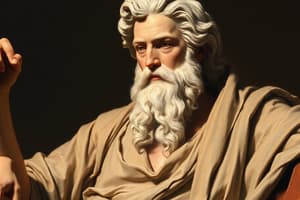Podcast
Questions and Answers
What significant event shaped Plato's early life and education?
What significant event shaped Plato's early life and education?
- His travels to Egypt
- The Peloponnesian War (correct)
- The trial of Socrates
- The founding of his Academy
Which philosopher's teachings greatly influenced Plato and formed the basis of his early dialogues?
Which philosopher's teachings greatly influenced Plato and formed the basis of his early dialogues?
- Theodorus of Cyrene
- Pythagoras
- Cratylus
- Socrates (correct)
What was the location of Plato's philosophical school, the Academy?
What was the location of Plato's philosophical school, the Academy?
- In the grove of Academus (correct)
- In the heart of Athens
- Near the Pythagorean community
- On the outskirts of Sparta
In what form has the majority of Plato's surviving writings been presented?
In what form has the majority of Plato's surviving writings been presented?
Who joined Plato's Academy at the age of 17 and later became a significant philosopher himself?
Who joined Plato's Academy at the age of 17 and later became a significant philosopher himself?
Flashcards are hidden until you start studying
Study Notes
Early Life & Education
- Plato was born around 428 B.C. during Pericles’ Athens' Golden Age.
- He belonged to a noble Athenian family; his father Ariston died in his childhood.
- His mother, Perictione, remarried politician Pyrilampes.
- Grew up during the Peloponnesian War (431-404 B.C.) and experienced political chaos post-Athens’ defeat by Sparta.
- Received education in philosophy, poetry, and gymnastics from notable Athenian teachers, including Cratylus.
Influences
- Became a dedicated follower of Socrates, who was accused of corrupting the youth, including Plato.
- Socratic method and its principles heavily influenced Plato's early dialogues.
- Wrote "Apologia," an account of Socrates’ trial, preserving Socratic philosophy.
- After Socrates' death, traveled for 12 years across southern Italy, Sicily, and Egypt, studying under Pythagorean followers.
Platonic Academy
- Founded the Academy around 387 B.C., viewed as the first Western university.
- Lectured to students from across the Greek world; significant influence on many contemporaries, notably Aristotle, who joined at age 17.
- Many of Plato's later writings originated from lectures held at the Academy.
- Died in 347 B.C., likely buried on Academy grounds.
Plato's Dialogues
- All surviving works are primarily in dialogue form; Socrates appears in all but one.
- Works are categorized into early, middle, and late dialogues based on style and content.
- The "Symposium" discusses love, promoting the idea of converting romantic desire into truth-seeking.
- In "Meno," Socrates explores the recollection of knowledge rather than mere learning.
- "Republic" analyzes the ideal state and individual soul, emphasizing a hierarchy in governance and morality.
- Late dialogues like "Timaeus" delve into cosmology tied to geometric perfection, while "Laws" emphasizes practical governance informed by experience.
Famous Quotes
- "Love is a serious mental disease."
- "When the mind is thinking it is talking to itself."
- "Wise men talk because they have something to say; fools, because they have to say something."
- "Music is a moral law. It gives soul to the universe, wings to the mind, flight to the imagination."
- "One of the penalties for refusing to participate in politics is that you end up being governed by your inferiors."
- "Man—a being in search of meaning."
- "Every heart sings a song, incomplete, until another heart whispers back."
Fast Facts
- Competed as a wrestler in the Isthmian Games, akin to the Olympics.
- Born Aristocles; "Plato" possibly a nickname referring to his physical stature.
- Died in 347 B.C.E., with remains buried at the Academy, though never discovered.
Key Contributions
- Established the Academy, emphasizing science and mathematics, earning the title "maker of mathematicians."
- "Meno" addresses virtue and the challenge of searching for knowledge.
- "Republic" is pivotal for discussing political and ethical justice and the ideal state.
- "Lysis" examines the nature of friendship and primary objects of love.
Real-Life Applications
- Critiqued democracy in "Republic," arguing that excessive freedom leads to self-serving rulers.
- Advocated for gender equality, asserting that women should not face limitations based on sex, despite acknowledging physical strength differences.
Studying That Suits You
Use AI to generate personalized quizzes and flashcards to suit your learning preferences.




